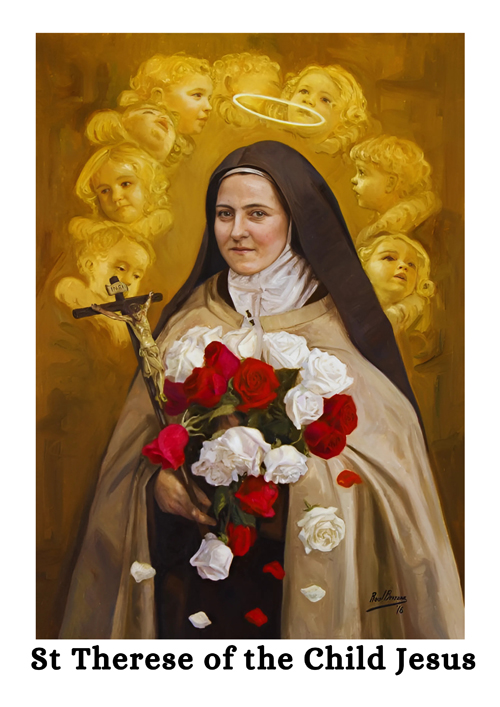St. Therese of Lisieux, also known as St. Therese of the Child Jesus, offers
profound inspiration for people of faith worldwide. Her spirituality, simple yet
transformative, reminds us that holiness is within reach through trust in God and love
in everyday life. By reflecting on her life, we are invited to embrace humility, love,
and trust as guiding principles in our own spiritual and secular journeys.
Marie-Francoise-Therese Martin was born on January 2, 1873, in Alencon, France,
into a family deeply rooted in faith and virtue. Her parents, Louis and Zelie Martin,
were later canonized as saints, and their home became a school of virtue for their
children. The youngest of nine siblings, Therese grew up in a household where faith
was lived out daily. Tragically, four of her siblings died in infancy, leaving a deep
mark on the family but also fostering a spirit of trust in God's providence. Despite this
sorrow, Therese’s childhood was filled with the warmth of her parents’ love and their
example of unwavering devotion to God. Her early years, however, were not without
suffering. At just four years old, Therese faced the profound loss of her mother to
breast cancer. This loss created a special bond between Therese and her father,
whom she affectionately called her “King.” Her sisters, particularly Pauline, stepped
into maternal roles, nurturing her and encouraging her faith. The deep love and
discipline within her family provided a foundation for her understanding of God as a
loving Father.
Therese’s sensitivity and emotional nature were evident from a young age, but her
family environment guided her towards spiritual resilience. When Pauline, her
spiritual role model, entered the Carmelite convent, Therese experienced an
overwhelming sense of loss. This separation triggered a mysterious illness that
baffled doctors. Through the intercession of the Blessed Virgin Mary, Therese was
miraculously healed, an event that deepened her devotion to Our Lady and
strengthened her trust in divine care. At the age of fourteen, Therese underwent her
“Christmas Conversion,” a profound moment of grace that transformed her life. It
freed her from her extreme sensitivity and gave her the strength to pursue her calling
with unwavering determination. She felt called to the Carmelite life, desiring to
dedicate herself completely to God. Despite being considered too young, her
persistent appeals, including a direct request to Pope Leo XIII during a pilgrimage to
Rome, eventually allowed her to enter the Carmelite convent at fifteen.
Life in the convent was both challenging and sanctifying. Therese embraced the
Carmelite ideals of prayer, sacrifice, and simplicity but also faced the realities of
communal living, including misunderstandings and moments of friction with others.
She used these challenges as opportunities to practice humility, patience, and
forgiveness. Her struggles became the foundation of her “Little Way,” a spiritual path
of sanctity through small, hidden acts of love and unwavering trust in God. She
believed that holiness did not require extraordinary deeds but rather great love in
every action. As she wrote, “What matters is not great deeds, but great love. “Her
time in the convent was marked by a profound love for Christ, particularly in His
Passion. She offered her own sufferings for the salvation of souls and prayed
fervently for priests and missionaries, seeing herself as a spiritual companion in their
work. Despite her cloistered life, her heart was burning with missionary zeal, desiring
to spread God’s love to the ends of the earth. Therese saw herself as a “little flower”
in God’s garden, blooming in simplicity and humility, trusting completely in His care.
In her final years, Therese experienced deep personal suffering, particularly as she
watched her beloved father, Louis, suffer mental and physical decline. She bore this
cross with quiet strength, uniting her pain to Christ’s Passion. Therese faced the
physical agony of tuberculosis and the spiritual trial of a “dark night of the soul.” Her
illness brought immense suffering, yet she bore it with serenity, offering it as a gift of
love for others. The spiritual darkness she endured tested her faith deeply, as she
experienced a profound sense of God’s absence. However, she chose to trust in
God’s love even in this desolation, offering her inner struggles for the salvation of
souls. She profoundly declared, ‘I want to spend my heaven doing good on earth.
After my death, I will let fall a shower of roses’. On September 30, 1897, at the age
of twenty-four, Therese surrendered her soul to God with her final words: “My God, I
love You.” Her death was not the end but the flowering of her mission. In the years
that followed, her autobiography, The Story of a Soul, captivated millions and
revealed the simplicity and beauty of her “Little Way.” In 1997, she was declared the
youngest Doctor of the Church, and her legacy continues to inspire those seeking a
path to holiness. Through her promise to shower roses from heaven, St. Therese
remains a beacon of hope, teaching us that even the smallest acts of love can bring
glory to God.
The life of St. Therese of Lisieux offers profound lessons for both our spiritual and
secular lives. Her example teaches us that holiness is not about grand gestures, but
about living each day with love, humility, and trust in God. Through her “Little Way,”
we learn that even the most ordinary actions, when done with great love, can
become a path to sanctity. Therese’s life challenges us to see every trial as an
opportunity to grow closer to Christ, and to offer our suffering as an act of love for the
salvation of others. As we reflect on her legacy, we are reminded that a life hidden in
Christ can transform the world, and that through trust, humility, and love, we too can
become instruments of God’s grace. Let us strive to imitate her virtues, not only for
our spiritual growth but to become beacons of God’s light in the world around us. As
St. Therese continues to shower roses from heaven, may we, too, live lives that
reflect her simple yet profound example of faith and love.















